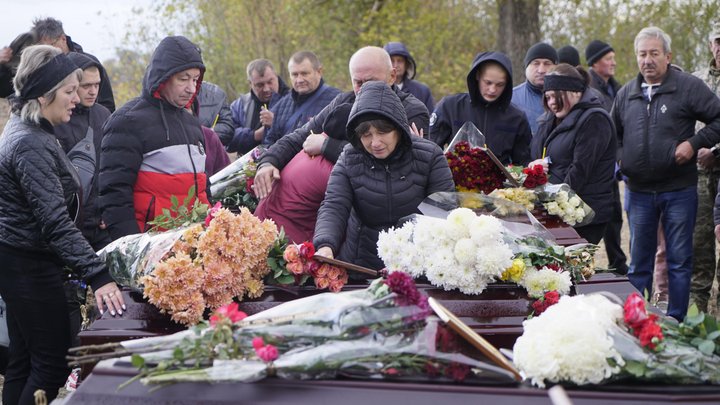Huge revenge sentences for elimination of Russian commander suspected of killing 59 civilians at Hroza funeral wake

A court in Russia has convicted two women of killing Konstantin Nagaiko, a Russian military commander accused by Ukraine of direct involvement in the missile strike that killed 59 civilians, including an 8-year-old child, attending a funeral wake in the village of Hroza (Kharkiv oblast). Unlike its massacre, Russia claimed that the killing of the believed perpetrator was an ‘act of terrorism’.
Virtually nothing is known about the two women, however the sentences were passed in absentia, meaning that Russia’s FSB did not simply grab the nearest Ukrainian and torture out a ‘confession’, as very often seems the case.
Russia’s state-controlled TASS agency reported on 29 June 2025 that Russia’s Second Western District Military Court had sentenced Ukrainian Maria Savosta and Russian Yelena Popova to 18 and 24 years, respectively, and had also imposed heavy (if hypothetical) 700 thousand rouble fines. Both women have, purportedly, been placed on what Russia claims to be ‘international wanted list’.
Both women were accused of ‘an act of terrorism’ under Article 205 of Russia’s criminal code, while Popova was also charged with explosives offences under Article 222.1, over the death on 30 December 2024 of 29-year-old Nagaiko, the commander of a Russian missile brigade. It was claimed that Savosta had sent Nagaiko a parcel with a collection of cosmetics and other items as a ‘New Year present’, with this passed to Nagaiko by Popova, via seemingly unidentified individuals who had left it on Nagaiko’s table. It is unclear whether Nagaiko is presented as having been exceptionally obtuse, or whether he is supposed to have known Popova. The parcel contained a homemade bomb which detonated when Nagaiko began unwrapping it.
Ukraine’s Military Intelligence reported that Nagaiko had been critically injured on 4 January 2025, and that he had died in early February. Since Russia has systematically fired missiles against schools, hospitals, residential buildings and civilian infrastructure since the beginning of is full-scale invasion of Ukraine, it is quite likely that Nagaiko was already, or would have been suspected of other war crimes. He was, in particular, accused by Ukraine’s Military Intelligence of involvement in the bloody missile strike on Hroza on 8 October 2023.
Hroza is a small village in the Kupiansk raion whose pre-war population of 300 had fallen to around 100 after Russia began its full-scale invasion. Over half the residents were killed by the Russians on 5 October 2023, at the café where a remembrance gathering was taking place, or at the adjacent shop. The Iskander missile strike was at around 13.20, when the building was likely to be full of people.
Residents of Hroza had gathered in remembrance of Andriy Kozyr, a slain Ukrainian soldier who had been reburied in the village. The soldier’s widow, as well as his son, who was also defending Ukraine, were killed in the strike.
Here, as always, Moscow claimed, against overwhelming evidence, that it had struck at a ‘military target’. Since the missile strike elicited international outrage and led to the UN’s High Commissioner for Human Rights announcing an investigation, Russia went into manipulative disinformation mode. Vasily Nebenzya, Russia’s ambassador at the United Nations, came up with two mutually contradictory stories. He claimed, on the one hand, that such missile attacks were ‘suspiciously convenient’ for Ukrainian President Volodymyr Zelenskyy and for Kyiv. This bizarre claim about an indisputably Russian Iskander missile strike was then made even more absurdly cynical by his apparent attempt to suggest that it was Ukraine’s “air-defence rockets” that Ukrainians should fear. Russia has been firing missiles at virtually all Ukrainian cities since 24 February 2022, with Ukraine’s air defence systems barely coping with protecting key targets, let alone the small village of Hroza, with around a hundred remaining residents, until Russia killed over half of them.
Nebenzya then went on to claim that the remembrance gathering had been a legitimate target and to suggest, both that there might soon, be death notices of Ukrainian “military personnel and foreign mercenaries”, and that Kyiv was concentrating many military personnel, heavy military technology or air-defence systems in residential areas.
The victims of this atrocity are all known, with 20 of them, including 8-year-old Ivan Kozyr, members of the Kozyr family who had gathered to remember a soldier killed defending his country and reburied in his native village.





